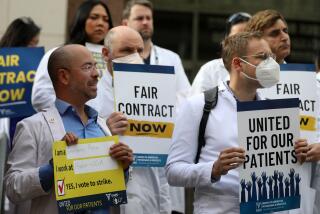Red Cross Assured of Blood Supply : Other Agencies Pledge Help If Strike Creates Local Shortage
- Share via
The regional American Red Cross has obtained commitments from national blood collecting organizations to forestall potential blood shortages that may result from the nurses’ strike in Los Angeles and Orange counties, a spokeswoman said Monday.
“We have commitments for as much blood as we need from the national American Red Cross and other non-Red Cross organizations around the country,” said Gerry Sohle in attempting to refute claims by picketing nurses that the regional blood supply may soon be dangerously low.
These commitments were confirmed by spokeswomen for the American Red Cross and the American Assn. of Blood Banks, who said blood is routinely shipped between regions when shortages occur. “We had made a commitment to provide blood to them if they have a need for it,” said Terry Gautier of the national American Red Cross in Washington.
“Right now, they appear to have as much blood as they need, as do all the blood banks in California,” said Jackie Campbell of the American Assn. of Blood Banks in Arlington, Va. “Nationwide, we are in really good shape,” she added.
The Red Cross announcement came as blood donations in Los Angeles and Orange counties slowed to a trickle Monday. The regional American Red Cross Blood Services closed its bloodmobiles and operated only three blood collection centers on the second day of the walkout by about 225 nurses.
Sohle reiterated earlier statements that the two-county blood supply is “adequate for at least a week,” but the striking nurses said there is only a two-day supply of blood.
No negotiations have been scheduled in the walkout over wage and working condition issues, according to Teresa Conrow, spokeswoman for Service Employees International Union Local 535. She said the nurses “are incredibly strong. We don’t know of a single union member who has crossed the picket line” since the walkout began Sunday.
The striking nurses are responsible for interviewing prospective donors and collecting about 8,000 units of blood a week at 10 Red Cross blood collection centers and on about 20 bloodmobiles in the two-county area. During the strike, about 20 nurses in management positions will perform these activities on a limited basis, Sohle said.
About 600 additional Red Cross personnel perform other blood bank operations, including the screening, storage and distribution of blood; these employees are not involved in the walkout.
A spot check of large hospitals, including Cedars-Sinai Medical Center, Harbor-UCLA Medical Center and St. Vincent Medical Center, revealed that most had not experienced effects of the strike.
“So far, so good,” said Dr. Ira Shulman, director of the blood bank at Los Angeles County-USC Medical Center. “As of this morning, we had a five-day supply of blood, assuming that no other blood would be given to us.”
Monday afternoon, pickets outside the Red Cross’ Vermont Avenue headquarters encouraged prospective donors to give blood elsewhere, distributing a list of 38 blood donation centers operated by individual hospitals. “We are not in the business of cutting off the blood supply,” said Julia Pollard, Local 535 president.
Inside, supervisory nurses collected blood from a handful of donors, a scene that was repeated at Red Cross collection centers in Santa Ana and Van Nuys.
Union officials disputed Red Cross statements on how much blood was available. “The lab technicians in the L.A. Red Cross center called us late last night and said there was only enough blood for two days,” Conrow said.
Asked if the union is worried that its position would be weakened by the Red Cross’ ability to import blood from across the country, Conrow said: “That’s fine on a temporary basis. . . . I don’t know for how long other places in the country can cover L.A. and Orange County.”
The two sides are divided on several issues. The Red Cross offerred across-the-board raises of 4% a year over the next three years. The union asked for raises of 6% in the first year, 5.5% in the second and 5.5% in the third year.
Top-scale registered nurses make $26,942 annually, and licensed vocational nurses get $18,840.
The nurses also want the Red Cross to increase staffing so that the ratio of nurses to donors is maintained at the traditional level of one nurse to three donors, rather than the one-to-four ratio to which it has been increased in recent months, according to the union.
They also want additional nurses scheduled to help out with autologous donors--those who donate blood for their own use in anticipation of surgery or other medical problems. The nurses say it takes more time to obtain donations for such patients.
About 500,000 units of blood are used in Los Angeles and Orange counties each year, according to Sohle. About 400,000 units are collected by the Red Cross and between 60,000 and 70,000 by local hospitals. An additional 40,000 units are brought in from other areas of the country.
More to Read
Sign up for Essential California
The most important California stories and recommendations in your inbox every morning.
You may occasionally receive promotional content from the Los Angeles Times.









